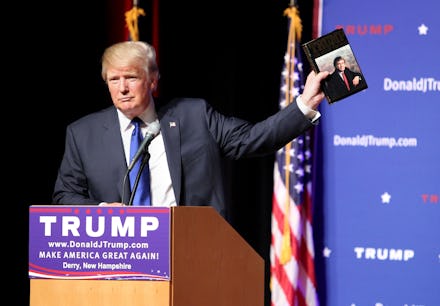Trump's Brazen Campaign Strategy Is a Page Out of His 1987 Memoir 'Art of the Deal'

He's demanded Mexico pay for a massive wall for its border with the U.S. He's retweeted an off-base neo-Nazi claim about blacks and violence. He's said he would order a total shutdown of Muslims entering to the country.
Real-estate billionaire and current Republican presidential front-runner Donald Trump has proven himself a pro at miring himself in vile controversy. But excerpts from his own memoir suggest it's been the plan all along.
In his 1987 book Art of the Deal, Trump wrote extensively on media manipulation and the power of controversy to drive personal success, per a tweet from Mic's Sage Boggs, who boldly took on the challenge.
These passages will ring a bell for anyone following his campaign: "One thing I've learned about the press is that they're always hungry for a good story, and the more sensational the better," Trump writes in one of the excerpts. "... the point is that if you are a little different, or a little outrageous, or if you do things that are bold or controversial, the press is going to write about you ... the result is that the press is always going to write about me."
In another, Trump writes the coverage is not always positive, "but from a pure business point of view, the benefits of being written about have far outweighed the drawbacks."
"The final key to the way I promote is bravado," Trump writes in another passage. "I play to people's fantasies. People may not always think big themselves, but they can still get very excited by those who do. That's why a little hyperbole never hurts. People want to believe that something is the biggest and the greatest and the most spectacular."
"I call it truthful hyperbole," Trump concludes. "It's an innocent form of exaggeration — and a very effective form of promotion."
Art of the Heel: The same tactics Trump wrote about — stirring controversy in the media with bravado, exaggerating while pandering to "people's fantasies" — he's brought to life on the campaign trail. When Trump recently called for the U.S. to deny entry to almost every Muslim in the world, the result was a "whirlwind" 18-hour media tour.
As the New York Times noted in its coverage of Trump's anti-Muslim plan, the candidate tends to make "surprising and even extreme comments" particularly whenever he is in danger of being overtaken in the polls by another Republican. That's what he did when fellow candidate Ben Carson began to creep up on Trump in Iowa earlier this fall. Trump, the Times wrote, "called [Carson] 'pathological' and compared his state of mind to a child molester'."
Carson has faded into the background, but the same day a poll indicated a growing threat from Sen. Ted Cruz (R-Texas), Trump came forward with his anti-Muslim speech.
The "more sensational the better," right?
Quite possibly. It would seem Trump's success in the polls seems to have everything to do with how much media coverage he can score, as was recently demonstrated by the Washington Post.
"Bravado" and success generating media coverage with an endless series of campaign stunts — remember when he gave out competing candidate Sen. Lindsey Graham's (R-S.C.) cell phone number on live television? — has certainly contributed to the Trump coup. He began with only a few staffers and has spent almost nothing on media buys compared to his rivals.
"You need to generate interest, and you need to create excitement," Trump writes in Art of the Deal. "One way is to hire public relations people and pay them a lot of money to sell whatever you've got. But to me, that's like hiring outside consultants to study a market. It's never as good as doing it yourself."
Now, Trump is expanding his campaign operation — but, as CNN recently reported, with a focus on "massive," media-friendly rallies.
"This notion that you have to have an event that has seven people show up at it to call it a success in New Hampshire, I think, is somewhat dated and may be the model that the candidates who can't fill rooms use," Trump campaign manager Corey Lewandowski told CNN.
Meanwhile, while Trump has relied upon the media to buoy his frugal campaign, the content of that coverage has scared off potential donors. As USA Today writes, "Attacking someone who has made an art out of mocking others isn't producing the desired results, which may explain why big donors are staying on the sidelines."
As for "fantasies," Trump is perfectly happy promising things he can't possibly deliver. It's basically his entire platform.
But it's not all media manipulation: While Trump has benefited greatly from high levels of media exposure, equal weight should be given to his other advantages. Those include his celebrity, a rightward shift in the GOP that has bred resentment between the most active conservative voters and the party's more cautious power brokers and a decades-long trend in the party towards racial conservatism.
"It isn't as if Trump is merely doing this in a vacuum, like a circus act confined inside a cage surrounded by onlookers who are only there for the sheer entertainment value," writes the Washington Post's Greg Sargent.
And the media is arguably simply doing its job by reporting on Trump. At some point in the election, his well-publicized negatives will likely sow the seeds of his own destruction.
Finally, there's always the possibility that Trump really is somehow stringing this campaign along day to day, and has just happened to hit a Republican Party ripe for destructive opportunism at the right moment.
In 1987, Trump wrote of the need for "innocent" hyperbole, but the response to increasingly lengthy list of bigoted remarks suggest the strategy that earned him billions in business dealings doesn't translate to politics.
Trump's media handler, Hope Hicks, did not respond to a request for comment from Mic.